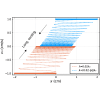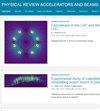色散电子冷却的理论和模拟研究
IF 1.8
3区 物理与天体物理
Q3 PHYSICS, NUCLEAR
Physical Review Accelerators and Beams
Pub Date : 2024-03-07
DOI:10.1103/physrevaccelbeams.27.033501
引用次数: 0
摘要
在电子冷却过程中,横向冷却率通常小于纵向冷却率,尤其是在高能情况下。通过引入分散冷却,可以在纵向和横向平面之间重新分配冷却速率。从理论上讲,实现分散电子冷却需要离子分散和纵向摩擦力的横向梯度。后者取决于许多因素,如相对动量偏移、横向位移、电子束密度分布和空间电荷效应。因此,可以根据这些因素采用多种方法来实现分散电子冷却。我们以直流电子束为基础,讨论并分析了这些因素及其各自对冷却速率的影响。我们首次提出了一种新的机制,通过将部分离子束置于电子束之外来实现均匀电子束的分散冷却。基于线性摩擦力模型,我们提出了一个简单的公式来对这些方法的冷却率再分布效应进行数值估算。分析结果与蒙特卡罗计算和数值模拟结果吻合。本文章由计算机程序翻译,如有差异,请以英文原文为准。

Theoretical and simulation study of dispersive electron cooling
In electron cooling, the transverse cooling rate is usually smaller than the longitudinal rate, especially at high energies. By introducing dispersive cooling, it is possible to redistribute the cooling rate between longitudinal and transverse planes. Theoretically, achieving dispersive electron cooling requires an ion dispersion and a transverse gradient of longitudinal friction force. The latter depends on many factors such as the relative momentum offset, transverse displacement, e-beam density distribution, and space charge effect. Therefore, several methods can be employed to achieve dispersive electron cooling based on these factors. Based on the dc electron beam, these factors and their respective impacts on the cooling rate are discussed and analyzed. For the first time, we propose a new mechanism to achieve dispersive cooling for a uniform electron beam by placing part of the ion beam outside of the electron beam. Based on a linear friction force model, we propose a simple formula to numerically estimate the cooling rate redistribution effect of these methods. The analytical results are in good agreement with Monte Carlo calculation and numerical simulation.
求助全文
通过发布文献求助,成功后即可免费获取论文全文。
去求助
来源期刊

Physical Review Accelerators and Beams
Physics and Astronomy-Surfaces and Interfaces
CiteScore
3.90
自引率
23.50%
发文量
158
审稿时长
23 weeks
期刊介绍:
Physical Review Special Topics - Accelerators and Beams (PRST-AB) is a peer-reviewed, purely electronic journal, distributed without charge to readers and funded by sponsors from national and international laboratories and other partners. The articles are published by the American Physical Society under the terms of the Creative Commons Attribution 3.0 License.
It covers the full range of accelerator science and technology; subsystem and component technologies; beam dynamics; accelerator applications; and design, operation, and improvement of accelerators used in science and industry. This includes accelerators for high-energy and nuclear physics, synchrotron-radiation production, spallation neutron sources, medical therapy, and intense-beam applications.
 求助内容:
求助内容: 应助结果提醒方式:
应助结果提醒方式:


